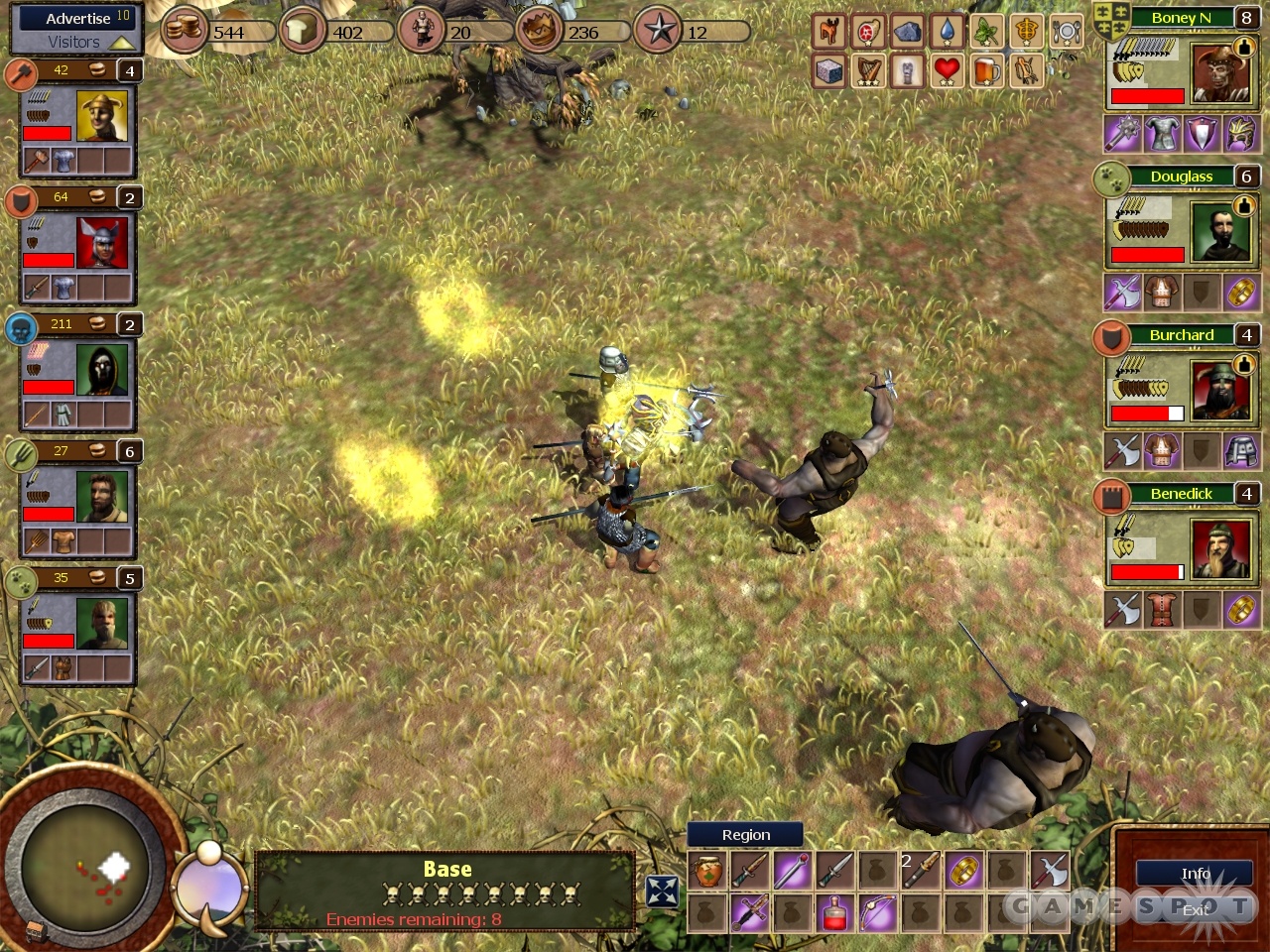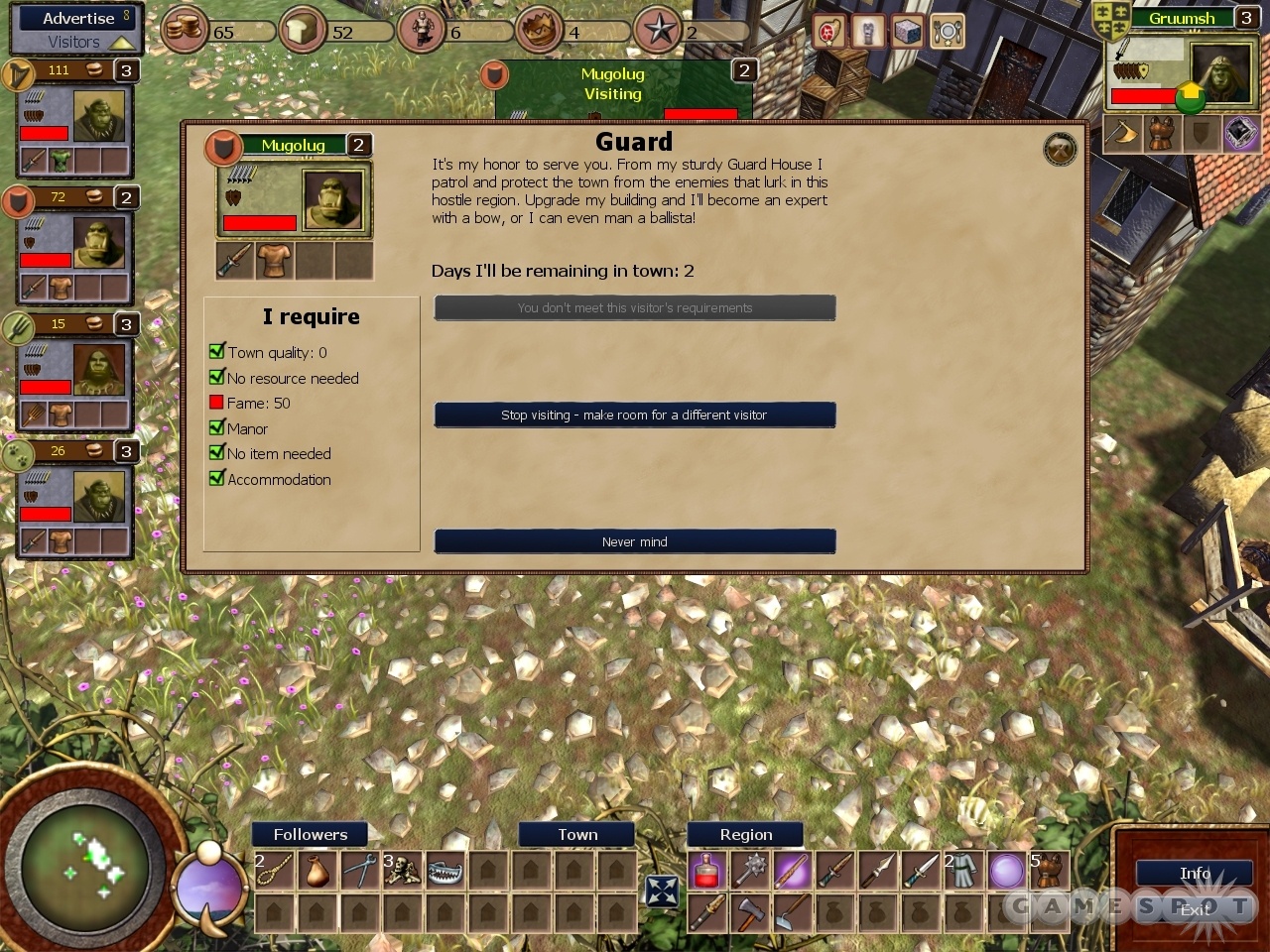Hinterland: Orc Lords may be one of the best games never released for the Commodore 64. OK, that doesn't sound complimentary in 2009, given that the computer system in question is a Cyndi Lauper contemporary. But this mash-up of a hack-and-slash role-playing game and a base-building real-time strategy has a refreshing old-time feel about it. Indie developer Tilted Mill (best known for 2006's Caesar IV) has put together a likable, fast-flowing hybrid that manages to feel like a remake of a golden oldie but also brand new. While the game isn't entirely successful, due to inconsistent difficulty, poor production values, and the lack of a tutorial, it delivers some appealing action for a bargain price of just $20.

At first, however, Hinterland is a tad frustrating. The game does not come with a paper manual or an in-game tutorial. An Adobe manual is automatically installed with the game, and the main menu tries to lure you to the official Web site with the promise of information in the forums; but, really, you shouldn't have to hunt around to uncover basic information on how to play a game you just bought. Thankfully, it isn't that complex. Aside from a few irritating early moments while you figure out the interface and maps, there aren't many stumbling blocks. Still, some sort of training mission should have been included.
Still, chances are good that you've seen all of this before, even if you haven't seen it all crammed into a single game. You play a typical RTS/RPG hero tasked with both building a medieval settlement into a full-fledged town and hacking the countryside to bits. A couple of dozen D&D archetypes are offered for the choosing as your alter ego, including such been-there, done-that sorts as an elven archer, a goblin thief, and an undead warrior. Oddly, there are actually only a few orc options. Regardless of skin color or pointed ears, the heroes are pretty much interchangeable. Each comes with skill bonuses that affect characteristics relating to settlement development and battle bonuses, but they otherwise could have rolled off of a Gygaxian production line. This sameness is further emphasized by generic visuals and sound. Buildings are typical medieval structures; maps are dull stretches of flowery grassland dotted with rare unique features, such as ruins and mushroom fields; and the music is a collection of triumphal odes that could have been clipped out of any RPG released in the past decade.
Your time is divided between managing a town as in a traditional Age of Empires-style RTS and roaming the wilderness looking for fights as in a traditional hack-and-slash RPG, such as Diablo. You begin in control of one location on the map with the goal of expanding your village while branching out to conquer neighboring territories randomly generated for each game. Victory is achieved by killing all enemies over the entire map, which varies between 20 and 50 enemy territories, depending on the size option you choose in the beginning. But fighting isn't all that interesting, even though you can do some nifty things, such as recruiting and outfitting town residents into makeshift adventuring parties.
Town development is really where it's at because settlements grow organically in a way not seen in a typical RTS. Instead of cranking out peasants, you rely on tourists. Every few days, your settlement attracts visitors with skills in such areas as farming, trapping, growing herbs, praying, selling stuff, and playing soldier. The catch is that they only stick around if you meet strict conditions. First, you need coins to build them their digs. Second, you need to fulfill a range of prerequisites, such as settlement quality and access to items; these include crystal balls and dragon eggs. Finally, you need to be famous. Even a bottom-rung sharecropper won't sign on to a lord without a high enough fame score, which is built through killing enemies and taking over territories on the map.
And this is where things get tough. While it is pretty easy to boost your fame in the beginning by killing the goblins, skeletons, spiders, dogmen, orcs, and other fantasy villains that populate the maps, penalties can cripple you. Getting killed, for instance, knocks a whopping 30 points off your fame, while failing a quest assigned by your monarch takes off an even more formidable 40 points. As peasants ask for a fair bit of fame to set up shop in your town, this can quickly put you behind the eight ball. A lot of the game is also random. Peasants of varying levels can seemingly show up at any time. When you've got 15 fame, you might see farmers and merchants popping by with demands of 50 or more. When you're loaded and looking for experienced help, you might see useless grunts arriving who ask for fame under 20. Monarch quests seem totally arbitrary, too. The big guy can ask for something impossible right off the bat, such as access to human souls when the only location on the map with a graveyard is guarded by ninth-level minotaurs that you can barely scratch. Later on, though, when you can offer up the big stuff, that same monarch might just ask for tiny donations of food and gold. At least you can turn off monarch requests.

The difficulty can seriously vary from one game to the next depending on your luck. There is only a single save slot, too, and games can only be saved when exiting, which prevents you from even trying again if you get killed at an inopportune time. Still, it's damn near impossible to stop playing. Although the random elements may feel a little unfair, there is something compelling about being kept on your toes by so many unforgiving surprises. Combining such a challenge with catchy, easy-to-play mechanics is another plus. This approach will be familiar to anyone who played strategy games a couple of decades ago because they were similarly built around simple hooks accentuated with brutal, haphazard difficulty. Games also fly by. Territories are guarded by no more than 10 or so enemies apiece, which keeps you from getting bogged down in too much monotonous clickfest combat. You can wrap up a match on the small map in about an hour or so, and even games on the medium and large maps tend to take no more than a single sitting of three-to-five hours to finish.
Although an old-school attitude makes Hinterland: Orc Lords a hard sell to the masses, the game is well suited to dedicated strategy and old-school gamers looking for a challenge. A few more options to ease the randomness would have been appreciated, but there's fun to be had here regardless.